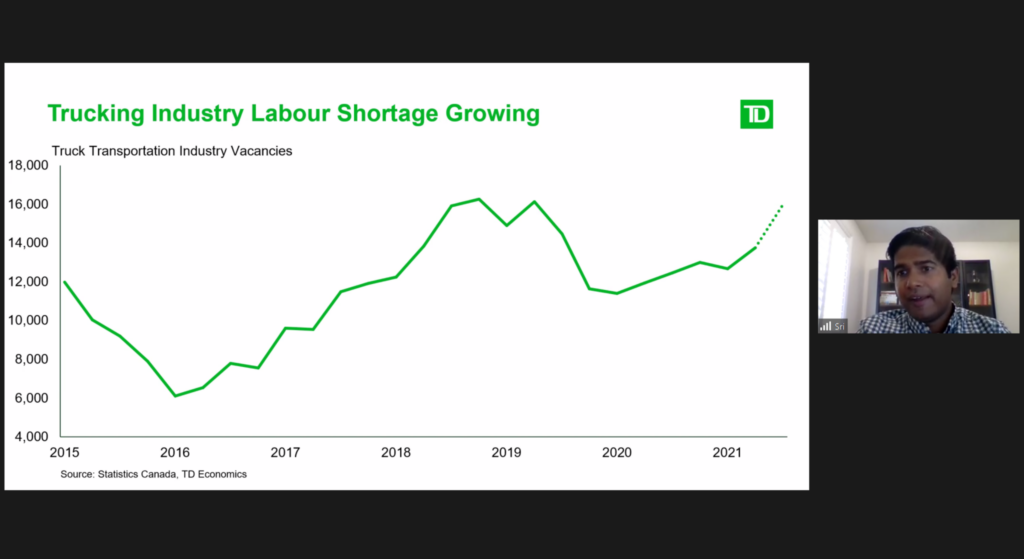Supply chain challenges continue to weigh down Canadian economy
The Canadian economy is growing, but a senior TD Bank Group economist says shortages of everything from labor to semiconductors continue to weigh on the supply chain.
While TD expects the Canadian economy to expand 4.4% in 2022, that target was adjusted downward because of the impact of the Covid-19 Delta variant and supply chain challenges, said Sri Thanabalasingam, in a presentation for the Toronto Trucking Association.

Those supply chain challenges were reflected in a recent survey of Canadian Federation of Independent Business (CFIB) members. In October, 30.5% of respondents said input shortages were a top concern. In 2019 only 4.2% cited that issue, he said. And 24.4% cited distribution constraints during the latest survey, up from 8% in 2019.
“Just getting your products where they need to go has become an issue for Canadian businesses,” Thanabalasingam said.
The same can be said for the components needed to produce trucks that move the goods.
Shortages of semiconductors – which have limited truck production – are by many reports expected to ease in the second half of 2022. But Thanabalasingam said even that forecast remains uncertain. As recently as the second quarter of this year, the shortage was forecast to ease by the end of 2021.
“Just getting your products where they need to go has become an issue for Canadian businesses.”
– Sri Thanabalasingam
The bank now expects supply chain constraints to last until the second quarter or even the second half of 2022.
Other supply chain challenges continue to be illustrated by backlogs at U.S. ports, which continue to be exacerbated by labor shortages in trucking, Thanabalasingam said.
“The U.S. might be facing even more severe trucking industry labor shortages,” he said, adding that it will take time to ease the port backlogs, even as the Biden Administration takes steps to keep ports operating around the clock.
The American Trucking Associations (ATA) has reported the U.S. trucking industry is short about 80,000 truck drivers today, representing an all-time high. Trucking HR Canada, meanwhile, identified 18,000 unfilled truck driving vacancies in the second quarter of 2021.
The number of job vacancies in trucking reached a peak in 2018-19, Thanabalasingam said. “We’re getting back to that peak.”
“In order to attract workers, there might be a case to be made for higher wages as well,” he told the online audience. “You’re competing for some of these workers.”
Trucking is not alone in the labor shortage. But labor shortages were a challenge in trucking even prior to the pandemic because of factors such as an aging workforce and employees looking for career opportunities that promise a different work-life balance, he said.
To compound the labor issues, immigration levels have also been low.
“Immigration was quite strong through 2016 through 2019. A lot of permanent residents were brought into Canada,” Thanabalasingam said. That changed during the pandemic. “Now with some of these measures being lifted, we’re expecting immigration to start to pick up.”
It’s not the only factor to trend upward.
Inflation could remain elevated well into 2022, he said, referring to projections that could see it reach 3.5% in 2022. Consumer demand for durable goods such as cars and electronics also remain robust.
“This was much stronger than we were even expecting in our December 2019 forecasts,” he said of the consumer demand. “Canadian households have built up quite a bit of spending power.”
And all of those goods will at some point need to move by truck.
Have your say
This is a moderated forum. Comments will no longer be published unless they are accompanied by a first and last name and a verifiable email address. (Today's Trucking will not publish or share the email address.) Profane language and content deemed to be libelous, racist, or threatening in nature will not be published under any circumstances.